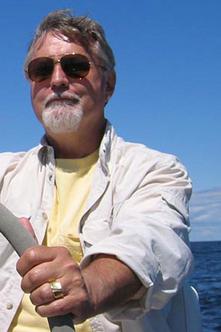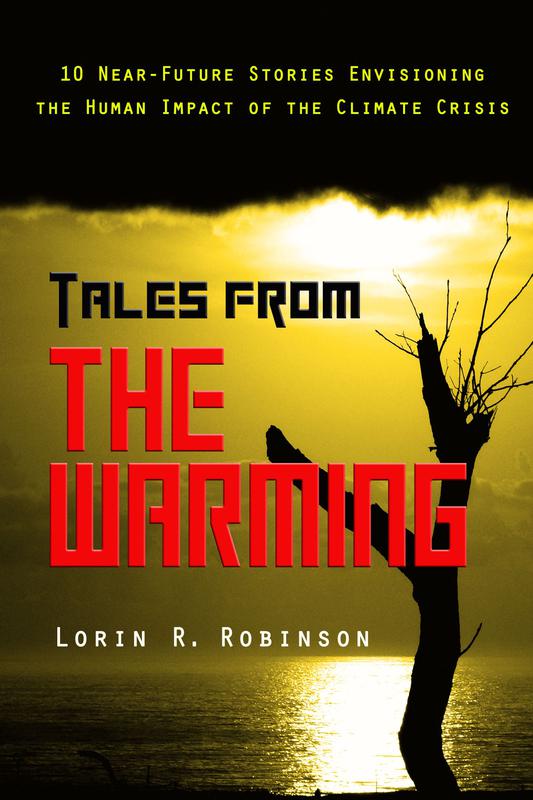©Moronic Ox Literary Journal - Escape Media Publishers / Open Books Next page
Author Interview
Moronic Ox talks with author Lorin R. Robinson
about his soon to be published book, Tales From The Warming
Moronic Ox: You seem to be making an effort to rename the phenomenon known as global warming. Why call it “the warming?”
LR: I’m just trying to get out in front. It’s well known that language tends to simplify over time. Why keep calling it “global warming” when “global” is redundant? In any case, the book needed a good title. Somehow, Tales of The Global Warming didn’t quite do it. Incidentally, I’m not a fan of the term “climate change.” I view it as a euphemism concocted by the polluters to help them dodge responsibility by blaming a changing climate and not the 40B tons of CO² dumped annually into the atmosphere. “Climate change” is in the same category as “friendly fire” and “collateral damage.”
Moronic Ox: Why did you decide to write a book of short stories about the warming and not take a more traditional novelistic approach?
LR: Climate Fiction is all over the map in terms of how it handles the subject matter. I originally thought I’d write a novel with a traditional story arc. But I quickly realized that the format was too restrictive for what I had in mind. I wanted to roam the globe over time to write about the human impact of the climate crisis. I wanted to put “real” people in harm’s way to imagine how they’d react. I also wanted to look at creative ways in which people might strive to mitigate the warming’s effects. Short stories allowed me to do that.
Moronic Ox: The time frame for the stories is 2022-2059. Why?
LR: I wanted to frame the stories in the context of the near-term; the context of the world as we still know it. I believe readers can better relate to what’s familiar and get a sense for how warming-related catastrophes will evolve. Unfortunately, the warming is insidious. Unlike most natural disasters, it has crept up on us. Every small increase in global temperature, every few additional inches of sea level, every increase in violent or unpredictable weather has been incremental and viewed as “the new normal.”
Moronic Ox: You don’t sound optimistic about the future. Aren’t efforts being made to reduce green-house gas emissions?
LR: I believe the warming will have civilization-changing impact and that the world of 2117 will not be a place we would recognize. “Too little, too late” sums up efforts to curb the coming crisis. All the recent talk notwithstanding, we continue to flood the atmosphere with CO² at the rate of 1,200 tons per second. And there’s no end in sight. A chemist will tell you that the CO₂ molecule is extremely robust. That means it takes a long time to disintegrate—up to 90 years, depending on temperature and pressure. So, every molecule that goes up some smokestack or out some exhaust pipe today will, potentially, be up there causing trouble into the next century. Thus, if we stopped burning all fossil fuels today and converted tomorrow to solar, wind, nuclear, hydroelectric and thermal energy sources, the warming would continue.
Moronic Ox: With that in mind, I guess it doesn’t really matter that President Trump, unlike his predecessor, denies the existence of global warming. You say nothing can be done about it anyway.
LR: No, I don’t mean to imply that we are completely helpless at this point. Drastic reductions in greenhouse gas emissions now and in future could help blunt and shorten the impact of the warming. However, Trump, our denier-in-chief, appears to plan to do exactly the opposite.
Moronic Ox: What do you hope readers will take away from your book?
LR: The first thing I hope is that people will read it. Climate Fiction suffers from the “bringer-of-bad-news” syndrome. You know. Kill the messenger. Humankind is adept at the practice of selective exposure. If we think some information is scary or contrary to our existing beliefs, we often won’t expose ourselves to it. These stories, though based on worst-case scenarios presented by climate science, are humanistic. They are peopled by characters looking and often finding solutions to the challenges presented by the warming. The primary takeaway is that, while it may be too late to stop the crisis, there are ways to mitigate its effects.
Moronic Ox Literary and Cultural Journal - Escape Media Publishers / Open Books Advertise your book, CD, or cause in the 'Ox'
Novel Excerpts, Short Stories, Poetry, Multimedia, Current Affairs, Book Reviews, Photo Essays, Visual Arts Submissions
Lorin Robinson’s career has been split primarily between university teaching/administration and business.
He chaired the Journalism Department at the University of Wisconsin—River Falls for 10 years after founding and managing the school’s public radio station. He then joined 3M Company as a marketing communications manager. After 24 years at 3M, he returned to teaching—in the Graduate College of Business, University of St. Thomas, Minneapolis.
Robinson has BS and MS Degrees in Journalism from Northwestern University and a PhD in Communication from the University of Minnesota.
Over the years he has also worked as a journalist, photojournalist, magazine writer and radio announcer.
He and his wife, Linda, split their time between Lake Elmo, MN; Taos, NM and Baja California Sur, Mexico.
Tales from The Warming is unique in the annals of climate fiction, a new literary genre spawned in the last decade by the climate crisis. The anthology of 10 short stories takes readers all over the world and over time to experience—in human terms—the growing impact of what the author has dubbed “The Warming,” the man-made catastrophe that is increasing the world’s temperature, raising ocean levels and causing increasingly violent weather.
The stories—powerful, prophetic and poignant—are thought exercises that blend fact and fiction to examine the human impact of the crisis. They are based on current worst-case scenarios proposed by climate science. Each concerns a different challenge thrust upon us by the warming. In them readers witness people’s struggles to deal with these new realities. Some of the stories put people in harm’s way; others focus more on human creativity in mitigating its effects.
Story locations range from Bangladesh to Venice, Los Angeles to Polynesia, South Sudan to Southwestern China, Mount Kilimanjaro to the Persian Gulf, Miami to Greenland. The time frame is 2022 to 2059, a period during which the world is beginning to suffer the far reaching effects of this civilization-changing phenomenon.



